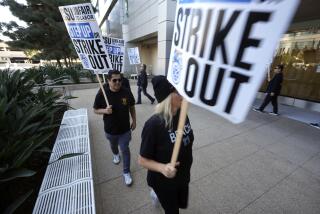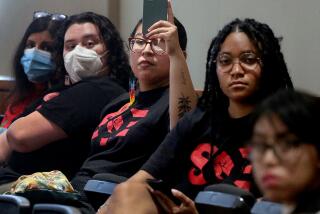UC Riverside leaders consider sweeping cuts in face of budget crisis
Should library hours be cut? Could some academic programs be closed or merged? Will turning down air conditioners and fixing leaky sprinklers save much money?
UC Riverside administrators are mulling such questions as they face an expected reduction in the campus’ core budget next year of at least 8%, or $38 million, even as they cope with higher pension costs and energy bills. The decisions could affect the livelihoods of employees and quality of education for more than 20,000 students at the Inland Empire campus.
Chancellor Timothy White recently told worried faculty and others to prepare for “the most difficult decisions you and I will ever make in our professional careers.”
Among the stakes, White said, are the Riverside campus’ ambitions to open a medical school in 2012 and remain a launching pad for minority students and those who are first in their families to attend college.
The 10 UC campuses have been through similar drills over the last three years of state budget crises, and alarms rang again recently with Gov. Jerry Brown’s call to cut $500 million from the UC system for the 2011-12 school year. What’s different this time is that campuses are being given more leeway to come up with solutions.
Chancellors have been assigned budget reduction targets, based on enrollments and other factors, that range from $96 million at UCLA and $81 million at UC Berkeley to $31 million at UC Santa Cruz and $27 million at UC San Francisco. (Only the five-year-old Merced campus, still considered a start-up, is being excused from the cuts.)
The campus approaches “will vary considerably,” said Nathan E. Brostrom, UC’s executive vice president for business operations, although many are likely to leave empty positions unfilled and hire fewer lecturers. Students may find it harder to enroll in courses, but the goal is to avoid “any overall diminution of the quality of their education,” he said.
UCLA, for example, is considering cutting what officials say are unnecessary course requirements for certain undergraduate majors and boosting enrollment in such profit-makers as summer school and professional master’s degrees. UC Davis says it may lay off up to 500 staff and introduce student fees for computer usage. UC Irvine and UC Berkeley may keep undergraduate enrollment flat but increase the number of out-of-state students, who pay higher tuition. UC Santa Cruz is discussing reductions as deep as 16% for nonacademic programs and 6% for academic units, including library book purchases on the main campus and extension classes in Silicon Valley.
And all campuses say it may become harder to come up with counteroffers for UC scholars who are recruited with lucrative pay and benefit packages by private universities or other public schools.
UC leaders are also looking for systemwide efficiencies in such areas as energy usage and computer purchases and are hunting for additional revenue from federal research grants and elsewhere. UC administrators have said they hope to avoid raising tuition beyond the 8% already approved for next year but have not ruled out an additional hike if the Legislature and voters refuse to extend several tax increases that are also part of Brown’s plan. The university’s Board of Regents is expected to weigh in with its own ideas at a meeting in San Francisco next week.
Whatever UC leaders do faces close scrutiny from faculty, unions and students at Riverside and elsewhere.
Already, UC students are organizing against the possible cuts and several hundred from across the system rallied last week in Sacramento and lobbied legislators. The atmosphere will get more tense and more extensive campus protests may erupt, student leaders predict, if the regents move to raise tuition again.
White’s mention of possibly shortening library hours upset Adriana Cruz, a second-year Chicano studies and sociology major from Anaheim who is active in student government. “That sends the wrong message to everybody who wants to come to UCR,” she said. “If we can’t prioritize our library hours, what does that say about our education?”
Cruz said she was worried that reduced course offerings already are making it harder for students to graduate in four years and that any further cuts will make things worse. “In honesty, we are scared,” she said. The school should reduce administrators’ salaries before taking such steps, she added.
Some critics contend that UC is starting its annual budget conversation early this year to scare students and parents into lobbying the Legislature for more funds. They also say that UC wants to protect a top-heavy and highly paid university bureaucracy and shield research professors from having to teach additional classes.
UC leaders like White say they must start planning now. The budget hole is much deeper than Brown’s $500-million reduction, officials contend, because that does not include the cost of shoring up UC’s shaky retirement funds. The situation also will worsen dramatically if the tax increases fail, they add.
White, a physiologist who became UC Riverside’s chancellor in 2008 after heading the University of Idaho, has formed campus advisory panels to review spending and revenue. And he is holding public forums so no one is caught by surprise.
He has ruled out cuts to police and health services but said he is looking at mergers of some departments, reducing programs at the campus’ Palm Desert facility and layoffs of non-teaching staff and non-tenured lecturers.
White also is pressing faculty to put more of their separately held research and donated funds, totaling about $2 million, toward classroom costs. That money is usually reserved for research trips or conferences. “It is time to change the way we go about hoarding our money,” said White, 61, whose budget planning was interrupted for a few days recently when he was hospitalized for a heart procedure.
Paul Beehler, who teaches writing classes and is president of the union local representing lecturers and librarians, said he appreciated White’s candor but said many people are nervous. “There is concern about maintaining the quality of the education, the preeminence of the UC and concern about jobs as well,” he said.
Beehler said he was particularly worried about White’s plans to protect tenured faculty while possibly laying off lecturers, whose ranks already are down 12% from 2007.
Administrators say this would be a tough time for UC Riverside to take a step back.
Along with preparing for its new medical school, the Inland Empire campus saw a 13% surge in freshman applicants this year, more than double the system-wide figure. For the first time, it was able to offer admission only to students who specifically applied to it and not to UC-eligible students referred there after being denied admission at other UC schools.
According to White, the campus is starting to sprint and the likely cuts feel like “having our tennis shoes tied together.”
More to Read
Start your day right
Sign up for Essential California for news, features and recommendations from the L.A. Times and beyond in your inbox six days a week.
You may occasionally receive promotional content from the Los Angeles Times.







